- Skip to primary navigation
- Skip to main content
- Skip to footer
Tress Academic
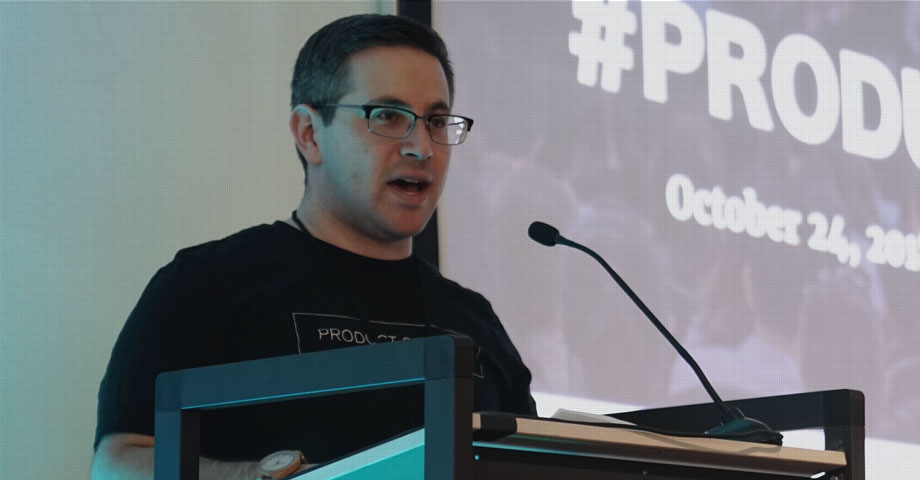

#30: Questions from the audience you should be prepared to answer
November 5, 2019 by Tress Academic
You can never know the exact questions that the audience will ask after you have finished a conference presentation. This uncertainty can cause additional stress for you, and put you on edge during your presentation. There are, however, a few questions you can assume that someone from your audience might ask. So why not prepare yourself for these questions just in case? We’ll tell you which type of questions these are, and how you can easily prepare yourself for them. Having answers ready for these standard questions will make the Q&A part so much easier for you and alleviate unnecessary stress on the big day.
When we recently held our course “How to present at international scientific conferences” at a Swiss university, we discussed the Q&A part that comes right after a conference presentation with the participants. They spoke about their experiences at conferences where they presented their research, and everything that made it especially difficult for them. The presentations were always a big cause of stress and anxiety for them – is it for you as well? If so, we have another post from the Smart Academics Blog that will help you to deal with being nervous, see #3: “How to cope with stage fright?” .
If you are not an experienced presenter, it is a pretty big thing to go out and stand in front of a large crowd of colleagues from your field and tell them about your work. What our course participants were most scared of – even more than giving the talk – was the moment after they had delivered their presentation and the session chair opened the floor for questions. This was the moment where the unexpected could happen because they didn’t know what the questions would be. The biggest fear in the moment was to receive questions that they cannot answer or that make them look inexperienced, ignorant or worse!
We totally understand this fear. Imagine you were well-prepared for a talk and had a good feeling throughout the presentation, but the questions from the audience could spoil the good impression. Just imagine if you would have no idea how to answer relatively simple questions – this would be a waste of!
Do you have the same fears? We’d love to help you overcome them! There are actually a handful of questions that are very likely to be asked. These are the type of questions that so often come up at conferences, especially when early-career researchers are presenting. You should be prepared for these questions, with an answer in hand, which is not difficult to do! It should be a part of your preparation for the conference talk to think about these questions. You will see, it takes a lot of stress off your shoulders!
Let us tell you about the most common audience questions at conferences below. If you want to prepare yourself for the next talk, download our free worksheet “Questions I should be ready to answer” .
Typical audience questions you should have an answer for
1. what’s next … .
Of all the questions that people from the audience could ask you, this is for sure one of the most friendly and helpful ones. This question offers no critique of your work, and it does not ask for clarification of anything you said in your talk. The questioner simply wants to know what your next research steps are. They are interested in your research and express curiosity of how it might go on.
So, make sure you have an idea about which follow-up steps you want to take with your research. Be prepared to tell the audience a little bit about how you might progress. Think about what you want to say before the question is asked and make a structure of the points you want to say, so you don’t leave out anything important. Use our free worksheet “Questions I should be ready to answer” to help you.
2. Why should we know more about this?
If you hear this question right after finishing your talk, you might feel a bit frustrated, or even threatened. Why is the audience asking this at the end? Wasn’t your talk clear enough? Have they not listened to you? It can sound as if the questioner doubts the value or necessity of your work. Or it could feel as if you were not clear enough when describing why you research what you do.
In fact, this is again a very friendly and helpful question. It has no negative connotation and the questioner has no intention of criticising you or your work. He or she may just want to know more explicitly from you why you did this research and why it is worth doing in such detail. It is a question about the relevance of your work.
So, what do you do? Tell the audience why you did your research, what you expect as its outcome and give some examples or applications to help them better understand why your work is needed. Use our free worksheet “Questions I should be ready to answer” .
3. How have you done this …?
This is a question about your methods or the overall approach you’ve applied. You will probably be surprised to get this question because you’ll think you had explained everything very clearly in your talk. Obviously, this was not the case for the person asking.
Don’t be scared! You have most likely not failed to talk about your methods, but in presentations, the reporting on the scientific methods that were applied to address a certain question is often the most difficult part for the audience to comprehend. Thus, it is not surprising that questions arise on the matter.
Properly describing the methods you applied in your research in a conference presentation is challenging. You hardly have the time to go into such detail in order to make the audience fully understand it. In a typical 15-minute presentation slot, which requires time for questions and discussion, so it is really more like a 10-12 minute talk, you have only a few minutes available to explain your approach.
For this reason, we advise participants in our courses to always keep the methods part of your presentation short, by reducing it to the main steps and avoiding too much detail. You should give only a rough outline of the steps because it is difficult, tiring, and sometimes also a bit boring for the audience to listen to a specific set-up of a workflow or a project when you have not been part of the project.
Instead, spend time in your talk presenting your problem, your findings, your examples, and your take-home message. This is what the audience needs to understand! But of course, it might then trigger a question about HOW have you done it, which again, you can prepare yourself for. It is really a friendly and helpful question from an interested person. The audience shows that they want to better understand how your work was done.
In your preparation phase, determine which methods or method steps could be unclear to your audience and what kind of information they would need to have for a quick understanding of a complex issue. Use our f ree worksheet “Questions I should be ready to answer” to help you prepare for this step.
4. What do you mean by …?
The fourth most common question that you can expect to receive is probably the easiest one to answer. It is a clarifying question where the questioner has not understood a specific term, a process, or an aspect of your presentation that you referred to.
Questions like this pose no threat but are necessary for your audience to fully get your talk. Don’t forget, you will also have some listeners in your audience that come from other fields and they might not be familiar with your specialist terminology. We can never know what the exact level of knowledge of our audience is, therefore, you will sometimes be surprised to get questions about aspects you think are common knowledge – they probably are not.
If you follow our rule to only include what you can explain yourself in your presentation, you will never have a problem with this question. If you fully comprehend what you talk about, you will always be able to address this question professionally. If you try to illustrate your vast knowledge by alluding to processes that you do not fully comprehend, you run the risk of not being able to further explain to them when asked by the audience. Keep your presentation air-tight to what you know you know!
You can prepare yourself with an overview of topics and aspects that probably somebody in the audience who isn’t from your field wouldn’t know and potentially need a clear explanation. Our free worksheet “Questions I should be ready to answer” will help you to prepare for this.
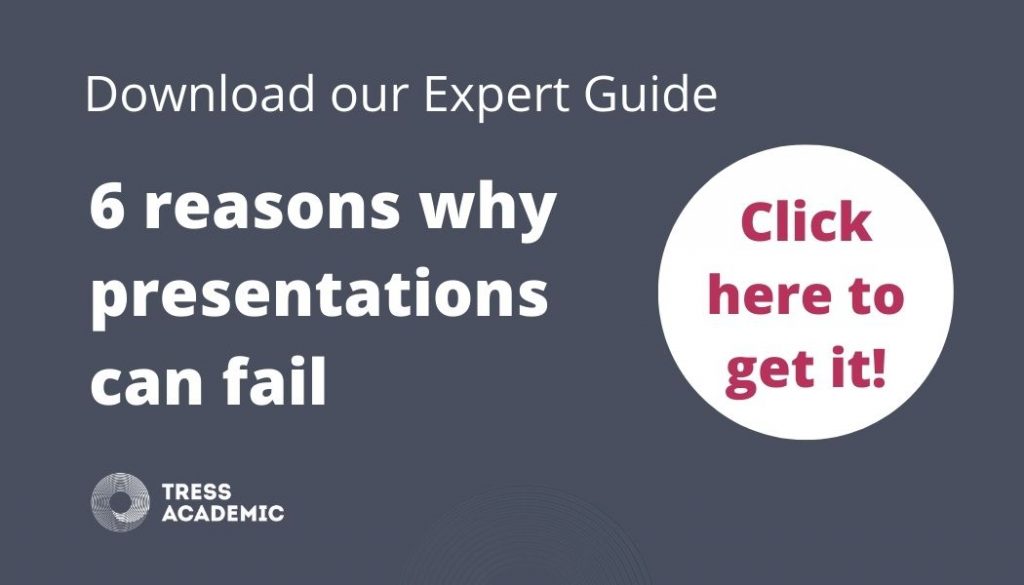
Naturally, the Q&A part of a conference presentation is the part that you can’t prepare for as precisely as the actual delivery of your presentation. There will always be an element of surprise for you and this is of course also the purpose of this interaction with the audience. They want to experience you off the cuff, where you have to show a bit of spontaneity. They are not coming to see a well-rehearsed play, but a glimpse of the scientists who are conducting this cutting edge work.
That does not mean everything taking place during the Q&A is random and you have to give yourself over to fate. An audience can feel when you are nervous and they feel for you when you are a less-experienced presenter. Therefore, they sometimes deliberately ask some of the questions above, because they know these are ‘soft-ball’ questions that you can answer. So, make sure you are prepared for them and show your audience that you have done the work and deserve their attention. We wish you best of luck with your next Q&A session!
Relevant resources:
- Worksheet “Questions, I should be ready to answer”
- Presentations course “How to present at international scientific conferences”
- Smart Academics Blog #03: How to cope with stage fright?
- Smart Academics Blog #24: New to the PhD? – 5 tips for a great start!
- Smart Academics Blog #26: First conference presentation? 17 life-saving tips
- Smart Academics Blog #95: Apply these 5 tips to improve any presentation
Relevant courses and services:
- 1-day course: Presenting successfully at virtual conferences
- 3-day course: How to present at international conferences
- 1-to-1 advice: Presentation Check
More information:
Do you want to present successfully at conferences? If so, please sign up to receive our free guides.
© 2019 Tress Academic
#ConferencePresentations #ConferenceTalk #QA #QuestionsAndAnswers, #AudienceQuestions
350 Top Q&A Questions to Expect for Any Presentations (Save Them Now!)
Zhun Yee Chew
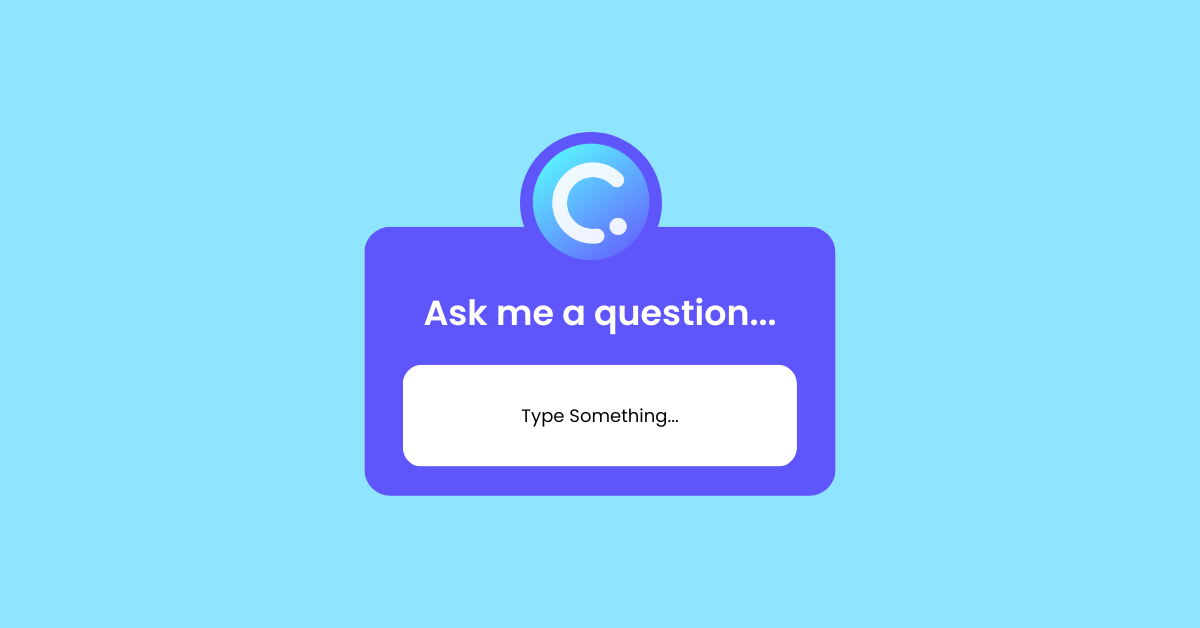
Preparing the slide content is nothing compared to dealing with daunting questions during the Q&A session of a presentation. Sometimes, if we are not lucky, we will face a tough crowd with even tougher questions that may leave us feeling challenged on the spot. And none of us likes the awkward moment of not being able to provide a satisfactory response to the audience.
Answering Q&A questions is a skill that everyone can master with the right resources and the right amount of preparation. You’ve searched, and we have them for you.
In this article, you will find more than 300 Q&A questions that are most commonly asked in a wide range of presentation occasions. Save them so you can be ready for even the most unexpected questions in your upcoming presentations!
What Are Q&A Questions?
Q&A questions, short for “Questions and Answers”, are inquiries posed by an audience or participants to the speaker or presenter during the Q&A session of a presentation . This Q&A segment typically follows a presentation, a talk or a lecture, providing the opportunities for the audience to seek clarification, ask additional information, or understand the speaker’s perspectives.
The whole point of Q&A sessions is to make the presentation more interactive and foster engagement . It’s a chance for the audience to pick the speaker’s brain and get a better understanding of the subject.
What Are the Different Types of Presentations?
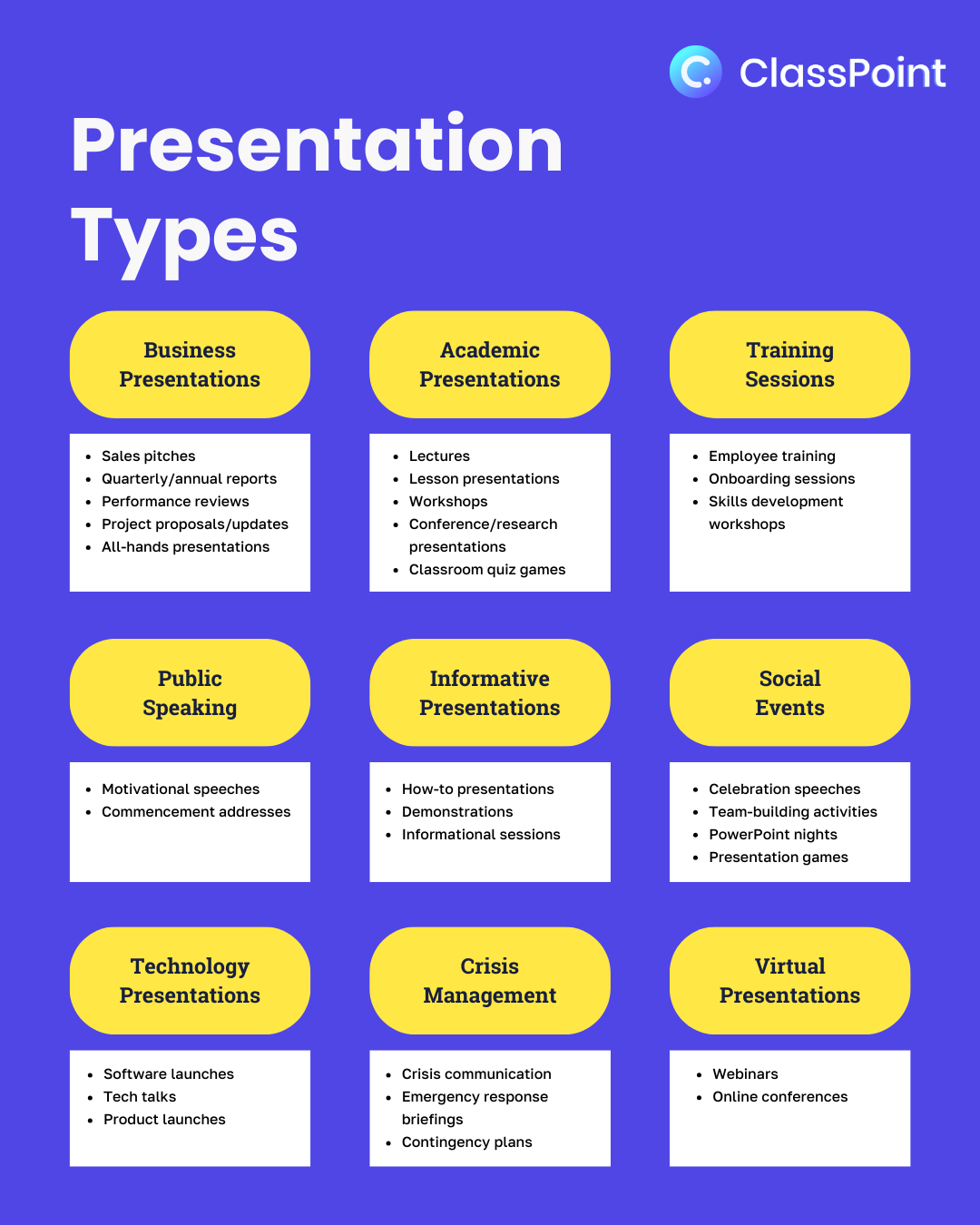
Business Presentations:
- Sales pitches
- Quarterly or annual reports
- Performance reviews
- Project proposals/updates
- All-hands presentations
Academic Presentations:
- Lesson presentations
- Conference/research presentations
- Classroom quiz games
Training Sessions:
- Employee training
- Onboarding sessions
- Skills development workshops
Public Speaking:
- Motivational speeches
- Commencement addresses
Informative Presentations:
- How-to presentations
- Demonstrations
- Informational sessions
Social Events:
- Celebration speeches
- Team-building activities
- PowerPoint nights
- Presentation games
Technology Presentations:
- Software launches
- Product launches
Crisis Management:
- Crisis communication
- Emergency response briefings
- Contingency plans
Virtual Presentations:
- Online conferences
Different presentations involve different audience types, and the nature of questions posed can vary significantly based on presentation formats and occasions. However, the core of a successful and engaging presentation remains constant – ensuring interactivity in a presentation and transforming it into a two-way street through Q&A questions and adding interactive elements or using interactive tools in your presentations.
Academic Presentation Q&A Questions
Q&a questions for lecture presentations.

- Can you provide more examples for the concept/theory you just explained?
- Are there any common misconceptions about this topic that we should be aware of?
- What are the main differences between this and [related topic]?
- Can you explain the steps involved in [specific process] in more detail?
- What are the current research trends or developments in this field?
- How does this concept connect to what we learned in the previous lesson?
- Are there any alternative approaches to solve the problems here?
- Can you recommend additional resources or readings?
- Can you provide some tips for studying this material effectively?
- Are there any real-world examples where this concept has been successfully applied?
- What are the most common mistakes students make when working on assignments for this topic?
- Can you explain the significance of this concept in the context of future careers?
- What are the ethical considerations associated with the topics we are discussing?
- Are there any current debates or controversies related to this topic?
- How does this topic connect with interdisciplinary subjects or other courses?
- Can you share examples of how this concept might be used in different industries or professions?
- Can you summarize the key takeaways of today’s presentation?
- Can you discuss any historical or cultural context that influences this topic?
- How might this information be relevant to current events or societal issues?
Q&A Questions for Academic Conference Presentations

- How did you decide on the research question or topic for your study?
- How did you select your sample or participants, and how representative is it of the broader population?
- Can you explain the methodology you used in your research and why you chose that approach?
- What are the main findings or key results of your study?
- How do your findings contribute to the existing body of knowledge in your field?
- Can you discuss any limitations or challenges you encountered during your research?
- What implications do your findings have for practitioners in the field?
- Can you elaborate on the theoretical framework that guided your study?
- What ethical considerations did you address in your research, and how were they managed?
- How did you validate the reliability and validity of your research instruments or methods?
- How did you address potential biases or confounding variables in your research?
- How do your findings compare to previous research on the same or similar topics?
- Can you discuss any unexpected or surprising results that you discovered during your study?
- How did you handle data analysis, and what statistical methods were employed in your study?
- What alternative explanations or interpretations of your data did you consider?
- How does your research contribute to addressing specific gaps in current knowledge?
- How did you control for potential confounding variables in your research design?
- What recommendations do you have for policymakers based on your research findings?
- How does your study relate to other recent or ongoing research in the same area?
- Are your findings generalizable to different populations or settings?
- How did you ensure the rigor of your data analysis and interpretation?
- What role did collaboration play in your research, and how did you handle disagreements within the research team?
- Can you share any unexpected challenges you faced during the research process?
- How might your findings be applied in a practical context, such as in industry or education?
- How did you establish the validity of your conclusions in light of potential bias or subjectivity?
- What potential areas for future research did your study uncover?
- Can you discuss the relevance of your research to current global or societal issues?
- How did you handle any limitations in available resources or funding for your research?
- What key takeaway message or lesson would you like the audience to remember from your presentation?
Q&A Questions for Student Presentations

- Can you elaborate on the research process you used to gather information for your presentation?
- Can you discuss the process of selecting and organizing the visual elements in your presentation, such as charts or graphs?
- How did you decide on the topic or key elements to include in your presentation?
- What challenges did you encounter while preparing for your presentation, and how did you overcome them?
- What did you learn about the topic that surprised you during your research?
- Can you explain the significance of your topic or its relevance to the course content?
- Can you discuss any alternative perspectives or counter-arguments related to your topic that you considered?
- What sources did you consult to ensure the accuracy and reliability of the information presented?
- Can you explain the connection between your topic and current events or real-world applications?
- Can you share any specific examples or case studies that support the points you made in your presentation?
- Can you elaborate on any implications or applications of your findings beyond the scope of your presentation?
- Can you discuss any ethical considerations related to your topic that you addressed in your presentation?
- How might your presentation contribute to the understanding of the broader course themes or objectives?
- What aspects of the presentation are you most proud of, and what would you do differently next time?
Q&A Questions for Project-Based Lessons

- What is the main goal or objective of this project, and how will our work contribute to it?
- Can you provide more details about the criteria for success in this project?
- How will our progress be assessed, and what are the key milestones or deadlines?
- Can you clarify the roles and responsibilities of each team member in the project?
- Are there specific resources or materials that we should use or reference for this project?
- Can you provide examples of successful projects from previous classes or students?
- Are there specific presentation or communication requirements for showcasing our project?
- What opportunities for feedback and revision will be available throughout the project timeline?
Business Presentation Q&A Questions
Q&a questions for sales pitches.

- What makes your product or service different from competitors in the market?
- Can you provide some specific examples of companies or clients who have successfully used your product/service?
- How does your product/service address specific pain points or challenges that customers commonly face?
- Can you share some success stories or case studies related to your product/service?
- How does your product/service integrate with existing tools or systems our company uses?
- What kind of support or training is provided to customers after they purchase your product/service?
- Can you explain the implementation process and how quickly we can expect to see results?
- Are there any customization options available to tailor the product/service to our specific needs?
- What kind of ongoing maintenance or updates does your product/service require?
- How do you ensure the security and privacy of our data when using your product/service?
- Are there any limitations or restrictions we should be aware of when using your product/service?
- How often do you release updates or new features to your product/service?
- Can you explain the scalability of your solution and how it can grow with our business?
- What is your company’s roadmap for future developments or enhancements to the product/service?
- What is the typical return on investment (ROI) that your customers experience after implementing your product/service?
- How do you handle issues or challenges that may arise post-purchase?
Q&A Questions for Work Presentations

- How does your proposal align with our company’s overall goals or strategic objectives?
- What potential challenges do you foresee in implementing this plan, and how do you plan to address them?
- Can you explain the specific roles and responsibilities of each team member involved in this project?
- What kind of timeline are you envisioning for the different phases of this project?
- Have you considered alternative approaches to achieve the same goals, and if so, what are they?
- What resources, budget, and manpower will be required to execute this plan successfully?
- How do you plan to measure the success or effectiveness of this project?
- Are there any potential risks associated with your proposal, and what mitigation strategies do you have in place?
- Can you provide examples of similar projects that have been successful in the past, either within our company or in other organizations?
- How will you keep stakeholders informed and engaged throughout the project lifecycle?
- What kind of collaboration and communication tools do you plan to use to keep the team connected?
- Are there any dependencies or external factors that could impact the timeline or success of this project?
- Can you explain how this project aligns with current industry trends or best practices?
- What are the potential roadblocks or obstacles you anticipate, and how do you plan to overcome them?
Q&A Questions for Performance Review Presentations

- Can you highlight specific projects or tasks where you feel you excelled?
- How have you demonstrated leadership skills and the ability to take initiative?
- Have there been any instances of conflict or difficult situations, and how did you handle them?
- What accomplishments are you most proud of since our last performance review?
- Where do you think you could have performed better, and what challenges did you face?
- How well do you think your current responsibilities align with your career goals?
- What new skills or responsibilities would you like to take on in the next year?
- How have you found the feedback and communication within the team or organization?
- How well do you feel you have contributed to team projects and collaborations?
- Are there ways we can enhance teamwork and collaboration within the team?
- Is there anything we can do to support you better in your role?
- What additional resources or training do you think would benefit you in your role?
- What motivates you in your work, and how can we ensure your continued motivation?
- What steps can we take to help you achieve your long-term career goals?

Q&A Questions for Annual/Quarterly Report Presentations

- How did specific projects or initiatives contribute to the overall success or challenges outlined in the report?
- What challenges or obstacles did the team face during the reporting period, and how were they addressed?
- Are there any unexpected or significant changes in the industry landscape that may affect future performance?
- What steps were taken to mitigate risks and uncertainties identified in the previous reports?
- Can you discuss the budgetary implications of the results presented in the report?
- How did the team adapt to changes in customer preferences or demands during this reporting period?
- How do the results align with the long-term strategic objectives of the organization?
- Can you discuss any feedback or concerns received from clients, customers, or stakeholders mentioned in the report?
- How did internal collaborations or cross-functional teamwork contribute to the outcomes presented?
- What initiatives or projects are planned for the upcoming quarter or year in response to the findings in the report?
- Can you elaborate on the return on investment (ROI) for specific marketing or promotional activities mentioned in the report?
- How do the current results compare to benchmarks or industry standards for similar organizations?
- Can you discuss any changes or improvements in operational processes that were implemented during the reporting period?
- Can you provide insights into any potential areas for improvement or focus in the coming reporting period based on the data presented?
Q&A Questions for All-Hands Presentations
- What are the key priorities and goals for the team in the upcoming quarter/year?
- Can you provide more details about the recent changes in team structure or leadership?
- How will recent industry trends or developments impact our team’s strategies moving forward?
- Can you discuss the reasoning behind recent policy changes or updates within the team?
- How will the team address challenges identified in recent performance reports or feedback?
- Can you provide insights into the budget allocation and resource planning for the team?
- How will the team adapt to changes in technology or tools that may affect our workflow?
- What professional development opportunities will be available to team members in the coming months?
- Can you share updates on recent achievements or milestones reached by the team?
- Can you discuss the team’s approach to fostering diversity and inclusion within the workplace?
- What strategies will be implemented to maintain team morale and motivation?
- Can you elaborate on the team’s strategy for managing workloads and preventing burnout?
- How will the team address any challenges related to communication?
- What steps will be taken to recognize and celebrate individual and team achievements in the future?
Public Speaking Q&A Questions
Q&a questions for motivational presentations.

- How did your background or experiences shape your perspective on the topic you discussed?
- How can individuals or communities apply the ideas you shared in their own lives or work?
- What impact do you hope your work will have on the future of [your topic]?
- How has your perspective on [your topic] evolved throughout your journey, and what lessons have you learned?
- How do you suggest we, as individuals, can contribute to or support the goals you outlined in your presentation?
- What advice do you have for someone who wants to get involved in or pursue a similar field or project?
- What are the common misconceptions or misunderstandings about [your topic] that you’d like to address?
- How can the audience stay informed or engaged with ongoing developments in your field or topic?
- Can you share personal experiences where you overcame significant obstacles and found motivation in [an area]?
- What advice do you have for dealing with [a personal issue]?
- How do you handle setbacks and failures in [an area]?
- What daily habits or routines do you recommend for sustaining long-term motivation?
- How can individuals at various career stages benefit from the insights you shared?
- Can you share examples of successful individuals who have been a source of inspiration for you?
Informative Presentation Q&A Questions
Q&a questions for youtube or online webinar presentations.

- How can I access the recording of this webinar for future reference?
- Can you recommend any additional resources for further learning on this topic?
- How does this information apply to different industries or professions?
- How do you suggest we adapt these concepts to our specific organizational context?
- How can we stay updated on new developments or research in this field?
- Can you suggest strategies for overcoming resistance to change when implementing these ideas?
- What role does ongoing professional development play in mastering the skills you discussed?
- How can individuals without a background in this field apply the principles you discussed?
- Can you explain the potential challenges or common mistakes people might encounter when trying this on their own?
- How do you foresee the future trends or developments affecting the subject of this webinar?
- Can you recommend specific tools or software that would enhance our implementation of these strategies?
- What are some key indicators of success when implementing the strategies you discussed?
- Can you discuss any industry standards or benchmarks related to the topics covered in this webinar?
- What would be the first step you recommend for someone looking to implement these ideas in their organization?
Q&A Questions for Demonstration Presentations

- Can you clarify the purpose or goal of the demonstration?
- What specific steps are involved in the process you just demonstrated?
- Are there alternative methods or tools that can be used for this demonstration?
- How long does it typically take to master this skill or process demonstrated?
- Are there any safety precautions that should be considered?
- Can you provide tips for troubleshooting or overcoming obstacles in the demonstrated activity?
- How does this demonstration apply to real-world scenarios or practical situations?
- Are there variations or advanced techniques related to this demonstration that you didn’t cover?
- Can you share examples of successful applications or projects that used the demonstrated technique?
- How does this demonstration align with current trends or innovations in the field?
- What feedback or suggestions do you have for individuals attempting the demonstrated task for the first time?
- Can you discuss any modifications or adaptations that may be necessary for different skill levels or abilities?
Training Presentation Q&A Questions
Q&a questions for training workshops.
- Can you provide more examples or practice exercises to reinforce the concepts you just covered?
- Are there any additional resources or recommended readings for further learning on this topic?
- Can you explain the specific steps or strategies for applying what we’ve learned in a real-world context?
- How often is this training updated to reflect changes in industry standards or best practices?
- How can we track our progress and measure the effectiveness of this training?
- Are there opportunities for practical application or hands-on exercises to reinforce the learning?
- Can you discuss any potential challenges or common difficulties participants might encounter during the training?
- Can you provide insights into how this training aligns with current trends or innovations in the industry?
- How will successful completion of this training impact our professional development or career advancement?
- What kind of ongoing support or resources will be available to participants after completing the training?
- Can you explain the relevance of each module or section of the training to our specific roles or responsibilities?
- Can you discuss any case studies or success stories related to individuals who have completed this training?
- Can you outline the specific skills or competencies participants are expected to gain by the end of the training?
Creative Presentation Q&A Questions
Q&a questions for brainstorming presentations.

- How did you arrive at the ideas presented during the brainstorming session?
- Can you provide more context on the criteria used to evaluate and prioritize the proposed ideas?
- Are there specific goals or objectives that the brainstormed ideas aim to achieve?
- How do the ideas generated align with the overall vision or mission of the team or organization?
- Can you discuss any potential challenges or constraints that may impact the implementation of these ideas?
- What steps will be taken to further develop and refine the selected ideas from the brainstorming session?
- How will the team decide which ideas to prioritize or move forward with?
- What role do you see each team member playing in the implementation or development of these ideas?
- What steps will be taken to test or prototype the most promising ideas before full implementation?
- Are there any potential synergies or connections between the different ideas presented?
- Can you discuss the anticipated impact or outcomes of implementing these ideas on the team’s objectives?
Q&A Questions for Creative Work Showcase Presentations

- What inspired your creative concept or idea?
- Can you discuss your creative process and how you generated or developed your ideas?
- How did you overcome creative blocks or challenges during the project?
- Can you share any unexpected twists or turns that occurred during the creative process?
- What influenced your choice of colors, themes, or visual elements in your presentation?
- Can you discuss any alternative concepts or ideas that you considered before finalizing your creative work?
- How did you decide on the overall tone or mood of your creative piece?
- Can you discuss any specific techniques or tools you used to bring your creative vision to life?
- How do you balance originality with meeting the expectations or objectives of the project?
- Can you elaborate on the symbolism or deeper meaning behind certain elements in your creative work?
- How did you ensure your creative work aligns with the intended message or purpose of the project?
- Can you share any unexpected challenges you encountered while executing your creative ideas?
- What advice do you have for others looking to enhance their creativity or embark on similar projects?
- Can you discuss any future plans or developments related to your creative work?
Q&A Questions for Portfolio Presentations
- How did you curate or select the pieces included in your portfolio?
- Can you discuss the overarching themes or concepts that tie your portfolio together?
- What criteria did you use to determine which projects or works to include in your portfolio?
- Can you provide insights into your creative process for one of the featured projects?
- How do you believe your portfolio reflects your growth or evolution as a professional or artist?
- Can you discuss any challenges you encountered while working on specific projects in your portfolio?
- What inspired the overall design and layout of your portfolio presentation?
- Can you share any feedback or critiques you received during the creation of your portfolio?
- How do you handle showcasing both personal and professional work in your portfolio?
- How do you stay updated on current trends or techniques in your industry, and how does this influence your portfolio?
- Can you elaborate on any technologies or tools you used to create or present your portfolio?
- How do you handle showcasing a diverse range of skills or talents in your portfolio?
- How do you balance consistency with variety in the presentation of your portfolio pieces?
- Can you provide insights into the decision-making process behind the visual and aesthetic choices in your portfolio?
Subject-Based Presentation Q&A Questions
Q&a questions for history presentations.
- Why is it important for us to study this particular historical period or event?
- Can you provide more context on the social and cultural aspects of the time you discussed?
- Are there any alternative perspectives or interpretations of the historical event you presented?
- How did political or economic factors contribute to the events you covered in your presentation?
- Can you discuss the impact of this historical period on contemporary society or global affairs?
- How do historians generally view or interpret the significance of the events you discussed?
- Can you elaborate on any controversies related to the historical topic you presented?
- Can you discuss any parallels or connections between the historical events you covered and current events?
- Can you elaborate on any lesser-known or overlooked aspects of the historical topic?
- What were the main causes and consequences of the events discussed in this lesson?
- How did global events or other regions influence the events in this specific historical context?
- Can you share more details about the key figures or individuals involved in the historical events?
- Can you discuss any social movements or cultural shifts that occurred during this time?
- Were there any controversies or debates among historians regarding the interpretation of these events?
- What primary sources or historical documents can we explore to gain a deeper understanding of this time?
- What lessons or insights can we draw from the mistakes or successes of the past?
Q&A Questions for Geography Presentations
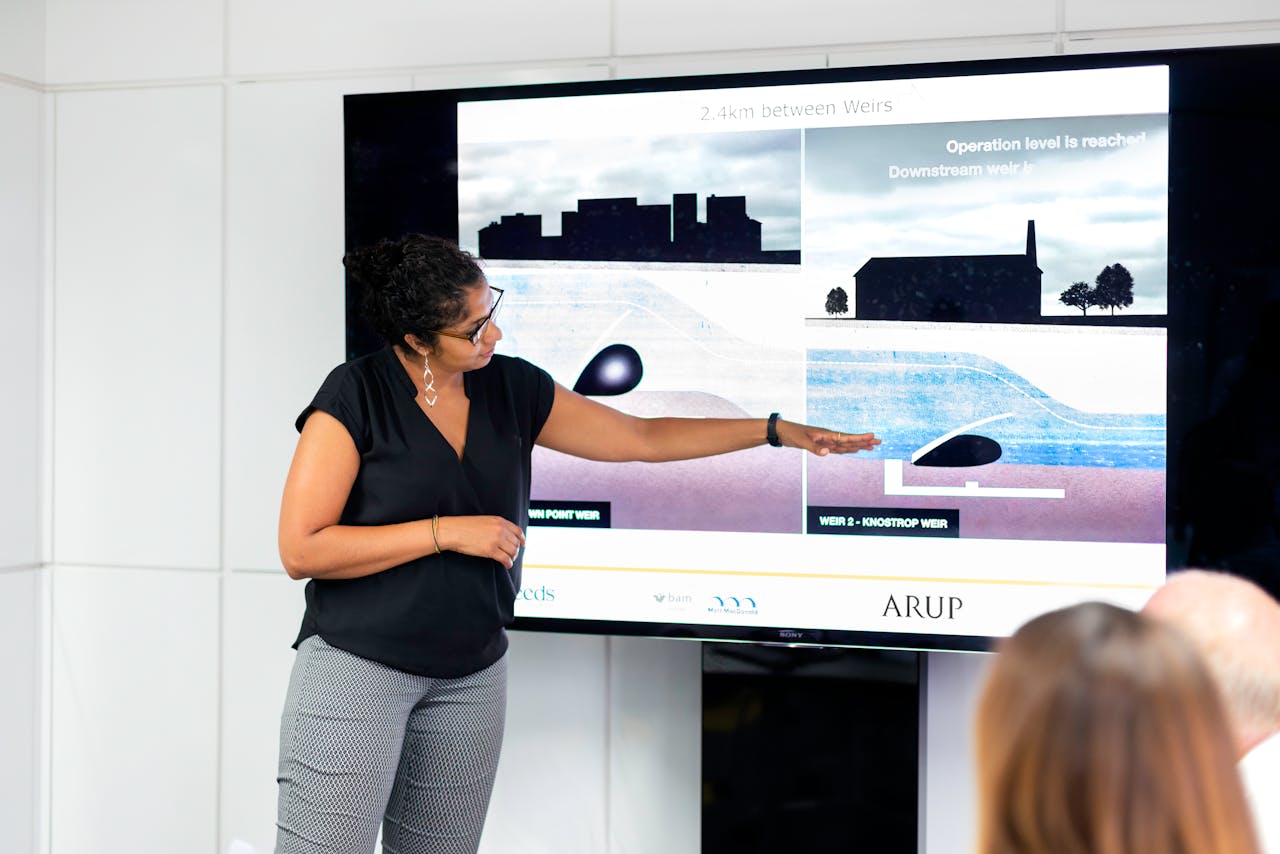
- Can you explain the significance of the geographical features discussed in this lesson?
- What are the cultural or societal aspects that make this geographic area unique?
- Can you discuss the environmental challenges or changes occurring in the region you shared?
- Are there any connections between the geography of a region and its cultural practices or traditions?
- How has human activity impacted the natural landscapes and ecosystems in the region?
- Can you provide insights into the economic factors shaping the geography of the area?
- How do political boundaries or geopolitical factors influence the geography of the region?
- Can you discuss any current or historical conflicts related to the geography you presented?
- Can you share examples of how globalization has impacted the geography you discussed?
- How does the geography of the area influence migration patterns and population distribution?
- Can you discuss any challenges or opportunities related to urbanization in the region?
- Can you provide examples of how transportation infrastructure shapes the geography of the region?
- How do the geographical features discussed impact the local economy and lifestyle?
- Can you discuss the role of sustainable development in shaping the geography of the region?
- How does the geography of a region impact the availability and distribution of resources?
Q&A Questions for Science Presentations
- How does this scientific theory or principle apply to real-world situations?
- Can you provide examples of experiments or demonstrations that illustrate the principles being taught?
- How do current advancements or research in technology influence our understanding of this science?
- Can you provide examples of how this scientific concept has been applied in various industries?
- Can you share insights into any ongoing or future research related to the subject of the lecture?
- Can you elaborate on any potential interdisciplinary connections between this science and other fields?
- How do you see the future developments or advancements shaping the field of science you discussed?
- Can you discuss any recent advancements or breakthroughs in the field related to your presentation?
- What experiments or studies have been conducted to support the information presented in your topic?
- Are there any unanswered questions or areas of uncertainty in the scientific understanding of this topic?
- Can you discuss the importance of peer review in the scientific process?
Q&A Questions for Social Science Presentations
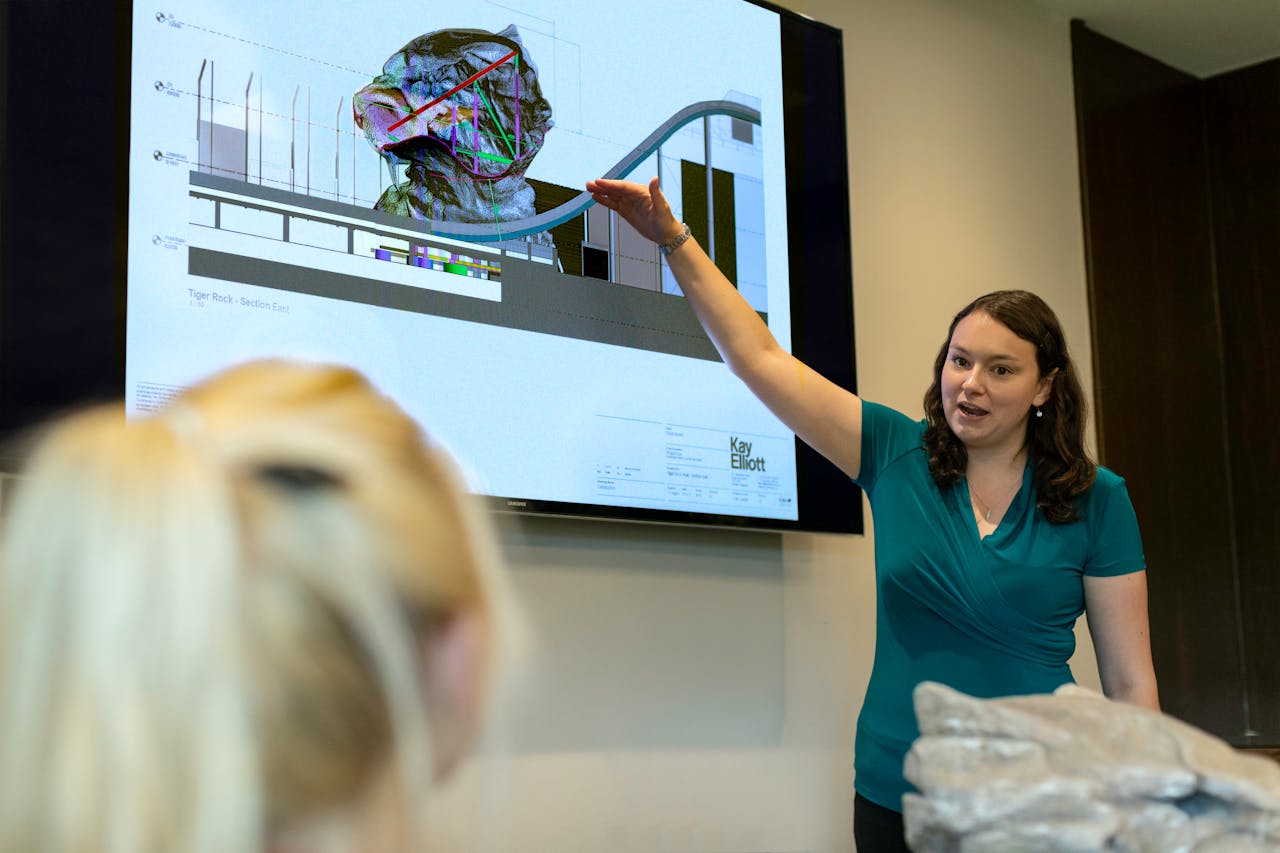
- Can you provide some background information on the topic?
- Can you explain the significance of any statistical analyses or data presented in this studies?
- How might cultural or societal factors influence the interpretation of the findings?
- Are there any primary sources or case studies used in the lesson to illustrate these social science concepts?
- What are the alternative opinions or perspectives that one should consider for this topic?
- How can we critically evaluate bias in the research?
- What are the roles of globalization or international perspectives in this topic?
- Why is [a perspective/opinion] the case?
- What are the potential objections for [a perspective/opinion]?
- How does the topic of this lesson relate to broader social issues or current events?
- Are there any conflicting theories or perspectives within the field related to this lesson’s content?
- Can you explain the practical implications of the theories or concepts covered in this lesson?
- How do the concepts covered in this lesson contribute to a deeper understanding of human behavior or society?
- What are some potential criticisms or limitations of the theories presented in this lesson?
Q&A Questions for Art and Design Presentations
- How do different artistic techniques contribute to the overall aesthetic of the piece?
- Can you explain the cultural or historical influences behind the art or design style being taught?
- How can personal experiences or emotions be expressed through art and design?
- Can you provide examples of famous artists or designers who are known for this particular style or technique?
- How does the use of color, shape, and composition impact the visual impact of the artwork or design?
- Are there any contemporary or modern trends in art and design that relate to the topic of this lesson?
- How does the art or design being taught relate to broader movements or styles in the art world?
- How can art and design contribute to social or cultural change?
Fun Presentation Q&A Questions
Q&a questions for powerpoint night presentations.

- Do you remember the time when we [shared a memorable adventure or experience]?
- What’s your favorite memory from our past travels together?
- If we were to plan a group vacation, what destination would you suggest for our bucket list?
- What’s one place you’ve always wanted to visit that we haven’t explored together yet?
- What’s the most spontaneous or unplanned adventure we’ve had?
- What’s our favorite inside joke?
- If we were to create a time capsule representing our friendship, what would you include in it?
- What’s the craziest or most unexpected thing we’ve ever done together?
- What’s your go-to travel snack or comfort food?
- What’s a shared goal or dream destination you’d like to achieve with the group?
- Can you recall the first time we met, and what was your initial impression of me?
- What’s a skill or talent of mine that surprised you when you first discovered it?
- If our group had a theme song, what do you think it should be and why?
- If we were characters in a movie, how would you describe our dynamic or roles?
- What’s a shared goal or aspiration that you think our group could work towards together?
- What’s your favorite thing about our friendship that you cherish the most?
- If we had a group motto or slogan, what do you think it should be?
Q&A Questions for PowerPoint Games
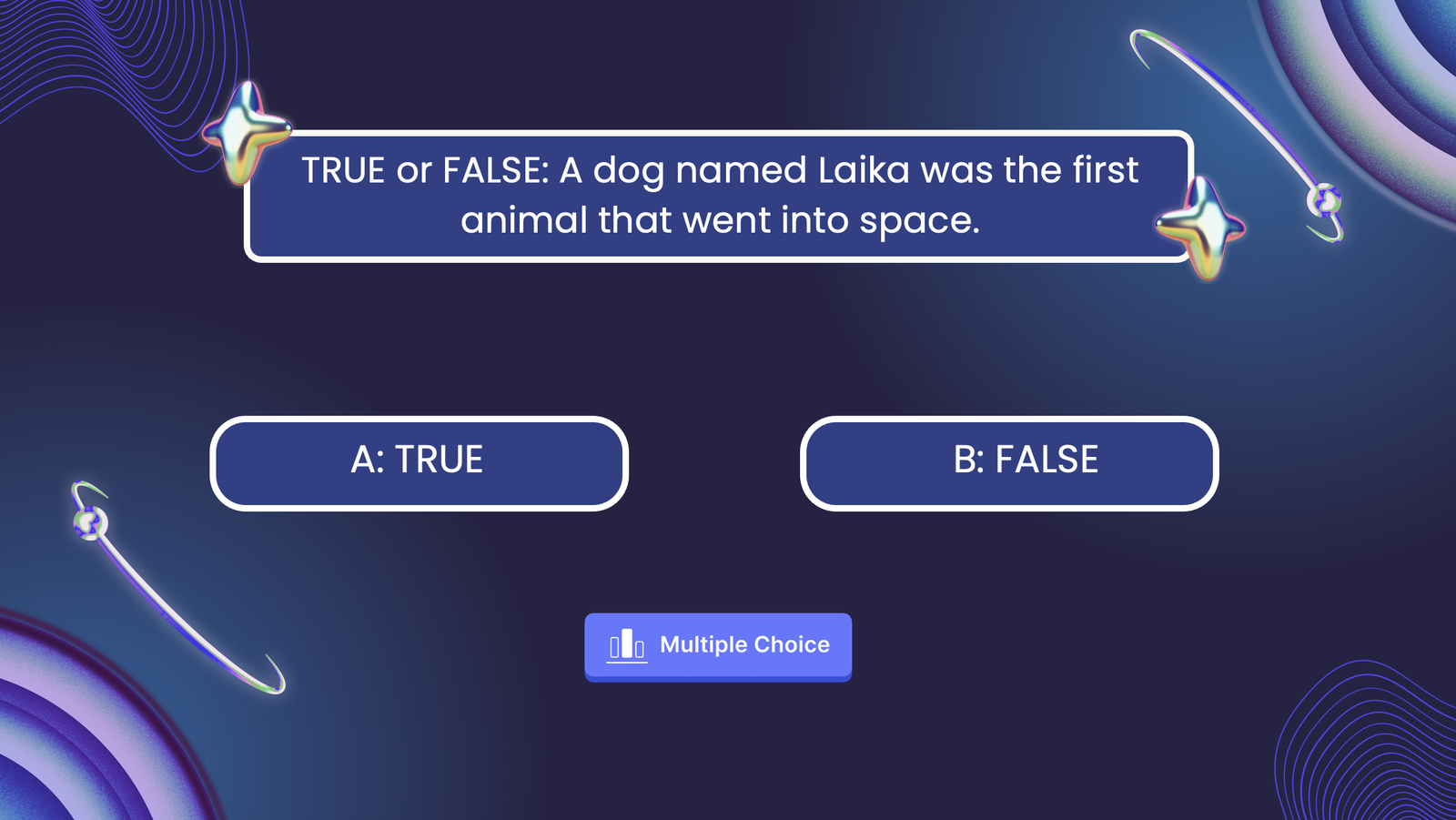
- What are the rules of the game?
- How long is the expected duration of the game?
- Are there any specific materials or equipment needed to play the game?
- Can you explain the objective or goal of the game?
- Are there any hidden surprises in the game that players might not immediately notice?
- Any secret tips for success in the game?
- Are there any special prizes or incentives for winners of tonight’s games?
- How is the game scored, and what determines the winner?
- What happens if there’s a tie in the game?
- Are there any variations or optional rules we should be aware of?
- Can you explain the order of play and how turns are determined?
- Are there penalties or consequences for certain actions during the game?
- Can participants form teams, or is the game strictly individual play?
- Are there any restrictions on player movement or interaction during the game?
- Can you provide examples of common strategies or tactics used in the game?
- How is cheating or rule violations handled in the game?
- Can you recommend any strategies for newcomers or first-time players?
Feedback Q&A Questions
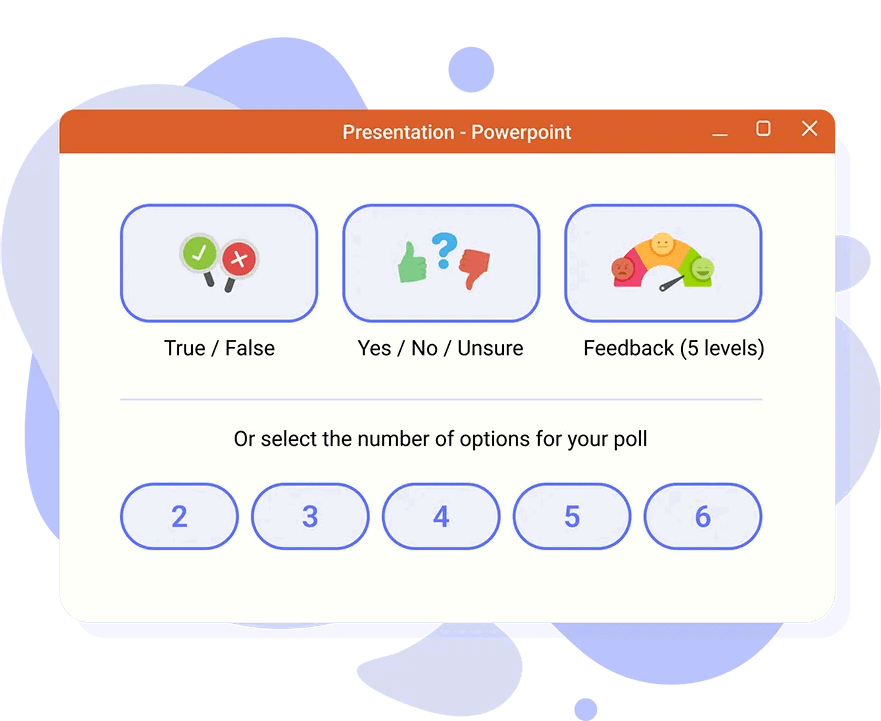
- What specific aspects of the presentation do you think were most effective?
- Can you provide suggestions for improving the clarity of certain points in the presentation?
- How well do you think the presenter engaged with the audience during the presentation?
- Were there any areas where you felt the presentation could have been more engaging or interactive?
- Can you offer insights into the pacing of the presentation and whether it was appropriate?
- What are your thoughts on the visual elements, such as slides or graphics, used in the presentation?
- Were there any technical issues or challenges that affected your experience during the presentation?
- Can you provide feedback on the overall organization and structure of the presentation?
- Were there any moments in the presentation that you found particularly memorable or impactful?
- Did the presenter effectively convey the key messages or takeaways of the presentation?
- How well did the presenter connect with the audience’s level of understanding or familiarity with the topic?
- Can you discuss any specific examples or anecdotes that resonated with you during the presentation?
- Were there any instances where the presenter could have provided more context or background information?
- What are your thoughts on the presenter’s use of language, tone, and overall communication style?
- Can you suggest ways in which the presenter could improve audience engagement or participation?
- Were there any aspects of the presentation that you found confusing or difficult to follow?
- Can you share your overall impression of the presentation and whether it met your expectations?
- What recommendations do you have for the presenter to enhance the overall impact and effectiveness of future presentations?
Closing Thoughts
With more than 300 Q&A questions to help you with your preparation, you can save so much time thinking and anticipating the questions your audience may ask during the Q&A session of your presentation. Now, you can focus on what matters most – acing your presentation!
BONUS: Lazy to create PowerPoint presentations from scratch? Try these 11 top-rated AI PowerPoint generators (they’re free!), as well as these 4 ways to use ChatGPT to create PowerPoint presentations .
About Zhun Yee Chew
Supercharge your powerpoint. start today..
800,000+ people like you use ClassPoint to boost student engagement in PowerPoint presentations.

IMAGES